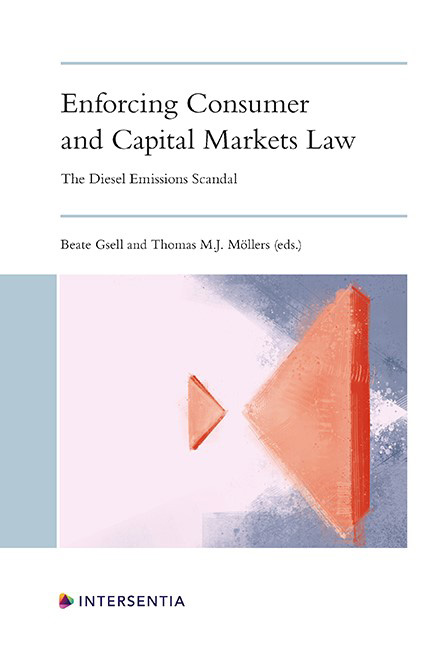Book contents
- Frontmatter
- Acknowledgement
- Contents
- List of Cases
- List of Abbreviations
- List of Contributors
- PART I INTRODUCTION
- PART II EUROPE
- PART II BEYOND EUROPE
- PART III THE SUPRANATIONAL PERSPECTIVE
- PART IV LEGAL PRACTICE PERSPECTIVE
- PART V INTRADISCIPLINARY ANALYSIS AND REFORM RECOMMENDATIONS
- Key Source Bibliography
- Index
- About the Editors
Enforcing Consumer and Capital Markets Law in Germany
Published online by Cambridge University Press: 22 December 2020
- Frontmatter
- Acknowledgement
- Contents
- List of Cases
- List of Abbreviations
- List of Contributors
- PART I INTRODUCTION
- PART II EUROPE
- PART II BEYOND EUROPE
- PART III THE SUPRANATIONAL PERSPECTIVE
- PART IV LEGAL PRACTICE PERSPECTIVE
- PART V INTRADISCIPLINARY ANALYSIS AND REFORM RECOMMENDATIONS
- Key Source Bibliography
- Index
- About the Editors
Summary
PRIVATE LAW/CIVIL PROCEDURE
ARE REMEDIES SUCH AS ELIMINATIONS OF CONSEQUENCES, DAMAGES AND SKIMMING OF PROFITS AVAILABLE?
Eliminations of Consequences
The elimination of the consequences of a breach of law is provided by German law only in a few regulations. As a rule, these regulations serve not only individual interests, but at least the interests of the general public as well. Moreover, these are all rules that combine omission duties and disposal obligations.
Elimination claims are provided for in the Injunctive Relief Act (UKlaG), in the Unfair Competition Act (UWG) and in the Law against Restraints of Competition (GWB).
a) Injunctive Relief Act (Unterlassungsklagengesetz, UKlaG)
The UKlaG allows certain consumer and business associations to claim that an entrepreneur has been using or recommending unlawful terms and conditions or engaging in anti-consumer law practices.
In the case of anti-consumer law practices, section 2 of the UKlaG expressly orders for the elimination of consequences. But there is also a duty of disposal according to the case law in cases where unlawful terms and conditions have been used (section 1 of the UKlaG).
Both Case 1 and Case 2 may in principle impose elimination actions, since they are anti-consumer law practices.
The problem, however, is that in Case 1 and Case 2 there is no danger of repetition, which in any case omits the injunctive relief claims. In addition, a right of action will only be available to special associations, but not to private buyers or investors. Moreover, the practical consequences of an eliminatio of consequences based on an injunction remain difficult to determine.
The elimination of consequences can blur the limit to the right to damages and the skimming of profits. Therefore, in view of the higher conditions of the law on damages, an individual compensation may not be granted by way of elimination action. As far as the use of general terms and conditions is concerned, however, according to the case law, a repayment obligation with regard to sums recovered illegally exists. It is still unclear whether this jurisprudence will continue to prevail. This is to be welcomed, at least in the case of low-value damages, in which associations file skimming of actions.
- Type
- Chapter
- Information
- Enforcing Consumer and Capital Markets LawThe Diesel Emissions Scandal, pp. 93 - 118Publisher: IntersentiaPrint publication year: 2020

